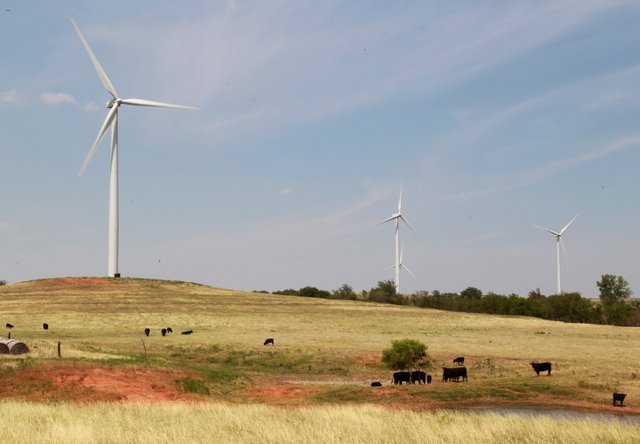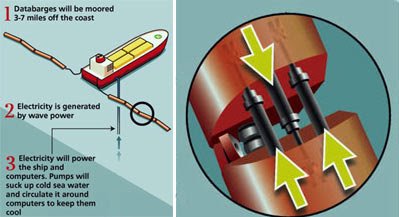
Wind power company NextEra Energy in Minko (pcs. Of Oklahoma) area of 20 000 hectares provides electricity to a large Google data center in Pryor (pcs. Of Oklahoma).
Last year, Google Inc. has consumed electricity as a large city: more than 5.7 KWH year. This does not prevent the search giant in 2017 to fully meet their needs from renewable energy sources - mainly wind and solar. The company said that all of its data centers and offices around the world over the next year will move to alternative energy sources.
In this statement loud Google has a few reservations.
Firstly, Google will not generate clean electricity independently. For her, it makes dozens of power a new generation of companies that have deployed windmills and solar panels on its power. Throughout last year, Google is not particularly flaunting their actions entered into a number of large transactions with such energy producers. In general, these transactions represent a guarantee for the purchase of a certain amount of energy is from these suppliers. Such guarantees are the key to financial stability and in-kind investments. With their help, the company can develop, invest in the construction and expansion of business.
Secondly, by Google practice like everyone else receives electric power from the electricity grid. This network is connected to all energy suppliers, including hydropower plants, nuclear power plants, power plants with natural gas, coal-fired, wind turbines and solar installations. Electricity from coal is not physically different from electricity, removed from the windmill. But the amount of direct contracts with alternative energy companies in the next year will reach a total power consumption of all Google data centers. This fact makes it possible to state that the company is completely converted to renewable energy sources. In principle, such a statement can be considered formally true. The main thing is that Google pays for it, and where the de facto go-generated electrons - this is a secondary question.
"We are the largest corporate purchaser of renewable electricity in the world, - said Joe Kava, Google's senior vice president of technical infrastructure. - It's good for the economy, good for business and good for our shareholders. "
He stressed the financial benefits of alternative energy. The main one is that the price of electricity from wind turbines does not jump dramatically as the price of oil and coal. This allows the company to reliably plan for future expenses. Sometimes even cheaper alternative energy produced from carbon-based fuels.
Google hopes that contracts with wind power with guarantees to purchase electricity to push the development of the entire industry. And this is happening. For example, the company NextEra Energy, owner of the aforementioned wind farm in Oklahoma, has built 115 wind farms in the United States and Canada.

Google headquarters in Mountain View.
Google's ambitions are not limited to their own power.
"Climate change is real. We are a global company, and our goal - to give everyone in the world the necessary tools and opportunities to help them protect the planet », - Google writes.
To this end, the company invested $ 2.5 billion in various projects of alternative energy, assists in scientific research on the protection of the environment, using the latest technology in-depth training for the analysis of environmental information: changes in the forest cover of the Earth, the oceans and other ecosystems.
Google is eyeing for a long time to alternative energy. For example, back in 2008, Google has become the largest investor in research and development in the field of geothermal energy, and later received a patent for a floating data centers - on board the barge with servers that are powered by wave energy.

Construction of floating Google data center in San Francisco Bay, 2013. The data center can be fed from the float generators: such a design patented by Google
Such ships are anchored at a distance of 11 km from the coast, where the waves scatter the standard, floating generators (pictured right).

The "date-barges" automatically solved one major problem - the way of accumulation and discharge of electricity. Here it is not necessary to take anywhere. It is consumed on the spot "production." In addition, the heat dissipation problem from the servers here are solved perfectly simply because the world's oceans - the best source for water cooling. Enough to put a simple pumps.
Prior to the practical realization of the idea is still far away. At first it assumed floating barge moored in the ports and be powered from shore. But in the long term, if the idea will spread, then Google may expand in the world's oceans on a fleet of their own energy sources. However, it will be difficult to connect to the Internet, except for the satellite channels. By the way, Google is funding the project Elon Musk to launch into orbit 4425 communications satellites that will provide services to high-speed access to the Internet on a global scale in the frequency ranges Ku (10,7-18 GHz) and Ka (26,5-40 GHz).
Google Go to renewable energy - a good help industry. This allows energy producers to scale and reduce the cost. The estimated doubling solar power plant cost is reduced by about 20%, and varicella - 12%.
Google and other examples of the following major IT-companies. Amazon is waiting on the results of 2016 to exceed the level of 40% of energy consumption from renewable sources, and recently announced five solar power projects. Microsoft with 3.3 KWH consumption in the year plans to reach the level of 50% in 2018.
Apart from Google, Apple, Facebook, Amazon, Microsoft, IKEA are making big time renewable energy investments.
Downvoting a post can decrease pending rewards and make it less visible. Common reasons:
Submit
unfortunately embracing renewable energy solutions not only about technology only its also mainly a culture ( as there is no need to the joy out of kick down , acceleration and drifting)
Downvoting a post can decrease pending rewards and make it less visible. Common reasons:
Submit